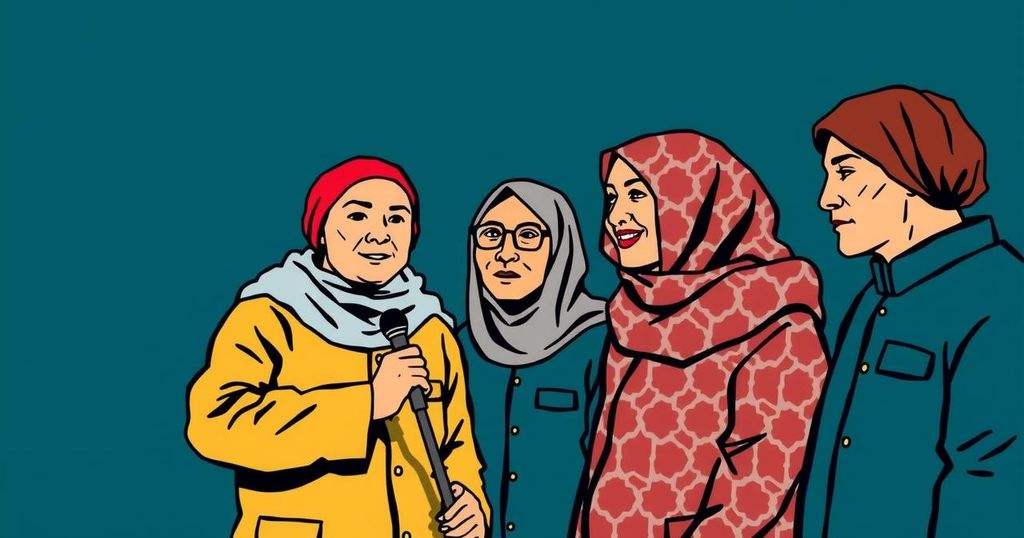The article addresses the anxiety and divisions felt within the Minnesota Muslim community in the lead-up to the 2024 elections, urging them to actively participate in the political process. It reflects on the author’s personal experiences and emphasizes the importance of voting locally to effect change, rejecting the notion of sitting out the election as a valid option. The call is to unite and harness their political power to advocate for justice and representation, specifically in light of ongoing global conflicts affecting Muslims.
In light of the significant turmoil surrounding the 2024 electoral cycle, the Muslim community in Minnesota is urged to recognize the profound impact this election has on their lives. The experiences of many, including my own, have embedded within us an understanding of division and the urgency of active civic engagement. My journey from Kenya, where I witnessed the struggles of marginalized communities, to becoming a U.S. citizen and engaging in electoral politics reflects a broader narrative: the unyielding importance of voting and striving for representation. As I brace myself for the upcoming elections, I am troubled by the inclination among some community members to abstain from voting altogether. This sentiment emerges amidst characteristics of reflection upon how certain presidential candidates perpetuate narratives of hate and violence toward Muslims and immigrants alike. I am filled with concern as I consider my child’s future in a world rife with Islamophobia and systemic injustice. There exists a palpable confusion and sense of helplessness among many in our community, particularly in light of global events such as the assault on Gaza. As we focus on the presidential race, it is imperative not to overlook the profound influence of local and state elections. Our efforts must not be confined to national politics; rather, we should strive to claim our voices at every level of government. The path forward for Muslim voters in Minnesota is clear: we must engage, organize, and amplify our voices. Voting should not merely be viewed as a declaration of one’s ethical stance; rather, it should be recognized as a means of shaping the political landscape to create an environment where our community can thrive. In Minnesota, we have made significant strides; our participation in local elections has led to the substantive advancement of policies, such as investments in affordable housing and programs for the youth. Yet, the journey is far from over. Listening to constituents illustrate the struggles they face can galvanize us into action. For instance, conversations with Somali parents worried about access to adequate health and education resources reveal the depth of personal stakes involved in this election. Let us also acknowledge the challenges posed by those who seek to undermine our progress through scapegoating and Islamophobia. We stand at a crossroads, where we can decisively choose to uphold fundamental values of dignity and respect for all individuals, regardless of their background. This election is crucial; it is an opportunity to reaffirm our commitment to representation and to securing a future wherein every Minnesota resident is given the chance to prosper. This November represents a pivotal moment for us to collectively reject divisive narratives and to embrace the political process as a means of effecting change. We must move beyond the notion that our votes are to be discarded in the face of imperfection. Instead, we should rally together to cultivate a political environment that not only acknowledges our existence but actively champions the rights and experiences of Muslims in Minnesota. Let us unite and work towards an inclusive future in which our voices echo in the halls of power. The path is challenging, but it is vital that we show up and assert our presence in the political landscape—this election is indeed about us.
The article presents a deeply personal narrative reflecting on the importance of electoral participation among Muslims in Minnesota, particularly in light of the divisive atmosphere surrounding the 2024 elections. The author shares their background, citing experiences that highlight the costs of social division and the urgency of civic engagement. It argues against voter apathy, emphasizing the need for Muslims to recognize their power in shaping political outcomes and demonstrate solidarity in voice and action within the electoral process. Given the ongoing global issues affecting the Muslim community, such as in Gaza, the author stresses the importance of local elections in fostering meaningful change and ensuring representation.
In conclusion, the urgency of the upcoming 2024 elections for Minnesota Muslims cannot be overstated. The need for active participation is paramount; it is not just about voting but about mobilizing to forge a political future that prioritizes inclusivity and justice. This is a call to action for the community to remain steadfast, to reject complacency, and to advocate for a Minnesota where all can thrive. Together, Muslims can leverage their collective voice to create substantial change, shaping a political environment that resonates with the needs and values of our diverse community.
Original Source: sahanjournal.com







